-
 Bitcoin
Bitcoin $106,731.2224
-1.05% -
 Ethereum
Ethereum $2,444.9804
-1.20% -
 Tether USDt
Tether USDt $1.0003
0.01% -
 XRP
XRP $2.1882
0.09% -
 BNB
BNB $651.1435
-0.61% -
 Solana
Solana $148.3252
-2.09% -
 USDC
USDC $1.0000
0.01% -
 TRON
TRON $0.2787
0.55% -
 Dogecoin
Dogecoin $0.1598
-3.16% -
 Cardano
Cardano $0.5520
-2.43% -
 Hyperliquid
Hyperliquid $39.0960
-2.64% -
 Bitcoin Cash
Bitcoin Cash $516.9519
2.98% -
 Sui
Sui $2.7011
-2.95% -
 Chainlink
Chainlink $13.0582
-1.71% -
 UNUS SED LEO
UNUS SED LEO $8.9250
-2.53% -
 Stellar
Stellar $0.2359
-0.18% -
 Avalanche
Avalanche $17.3856
-3.73% -
 Toncoin
Toncoin $2.8095
-3.56% -
 Shiba Inu
Shiba Inu $0.0...01121
-1.95% -
 Litecoin
Litecoin $85.2795
-0.85% -
 Hedera
Hedera $0.1471
-2.15% -
 Monero
Monero $319.8004
1.12% -
 Dai
Dai $1.0001
0.01% -
 Ethena USDe
Ethena USDe $1.0001
0.02% -
 Bitget Token
Bitget Token $4.5344
-1.07% -
 Polkadot
Polkadot $3.3224
-2.96% -
 Uniswap
Uniswap $6.9697
-2.75% -
 Aave
Aave $266.1658
-2.25% -
 Pepe
Pepe $0.0...09414
-3.41% -
 Pi
Pi $0.4913
-3.29%
How to deal with the decline of PEPE after buying it? Is it more reasonable to cover the position or stop loss?
If PEPE's value drops, consider covering the position if you're in for the long haul, or stop loss to minimize risk, based on your investment goals and market trends.
May 04, 2025 at 08:21 pm
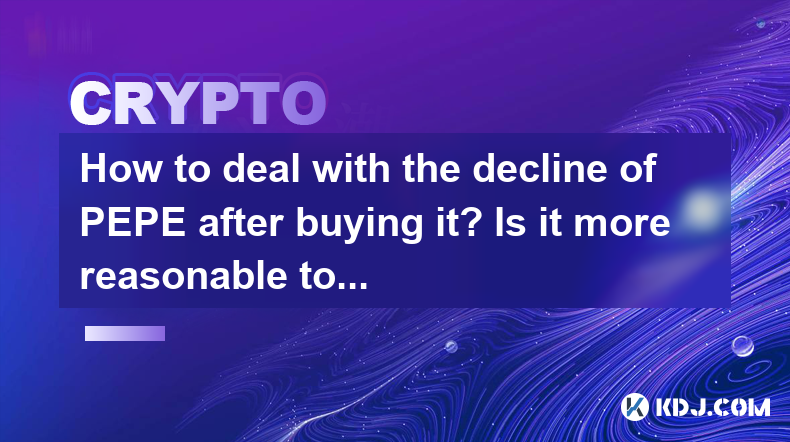
Introduction to PEPE and Its Market Performance
PEPE, a meme cryptocurrency inspired by the popular internet frog Pepe, has seen significant fluctuations in its market value since its inception. Like many meme coins, PEPE's price can be highly volatile, often driven more by social media trends and community sentiment than by fundamental value. If you find yourself in a situation where the value of PEPE has declined after you've bought it, you're faced with a critical decision: should you cover the position or stop loss? This article will delve into both strategies, helping you make an informed decision based on your investment goals and risk tolerance.
Understanding Covering the Position
Covering the position, also known as averaging down, involves buying more of the asset at a lower price to reduce your average cost per unit. This strategy can be appealing when you believe the asset's price will rebound and you want to hold onto it for the long term.
Pros of Covering the Position:
- Lowers your average cost per unit, potentially increasing your profit margin if the price rebounds.
- Demonstrates confidence in the asset's future value, which can be psychologically beneficial.
Cons of Covering the Position:
- Increases your exposure to risk, as you're investing more money into a declining asset.
- May lead to further losses if the price continues to drop without rebounding.
Understanding Stopping Loss
Stopping loss involves selling your asset at a loss to prevent further decline in value. This strategy is often used to mitigate risk and protect your capital from significant losses.
Pros of Stopping Loss:
- Limits potential losses, allowing you to preserve capital for future investments.
- Provides a clear exit strategy, which can help manage emotional responses to market volatility.
Cons of Stopping Loss:
- Realizes immediate losses, which can be psychologically challenging.
- May result in missing out on potential rebounds if the price recovers after you sell.
Evaluating Your Investment Goals and Risk Tolerance
Before deciding whether to cover the position or stop loss, it's crucial to evaluate your investment goals and risk tolerance. Are you investing in PEPE for the long term, or are you looking for short-term gains? How much risk are you willing to take on, and what is your financial situation?
Long-term Investors: If you believe in the long-term potential of PEPE and are willing to weather short-term volatility, covering the position might be more suitable. This strategy allows you to hold onto your investment and potentially benefit from future price increases.
Short-term Traders: If you're focused on short-term gains and want to minimize risk, stopping loss could be a better option. This approach helps you cut your losses quickly and move on to other investment opportunities.
Analyzing Market Trends and Sentiment
Understanding the current market trends and sentiment around PEPE can provide valuable insights into whether to cover the position or stop loss.
Market Trends: Analyze recent price movements, trading volumes, and technical indicators to gauge the overall direction of PEPE's price. If the trend indicates a potential rebound, covering the position might be more favorable.
Sentiment Analysis: Monitor social media platforms, forums, and news outlets to understand the community's sentiment towards PEPE. Positive sentiment and growing community support could signal a potential price increase, making covering the position a more attractive option.
Practical Steps to Cover the Position
If you decide to cover the position, follow these practical steps to execute the strategy effectively:
Assess Your Financial Capacity: Determine how much additional capital you can afford to invest without jeopardizing your financial stability.
Calculate Your New Average Cost: Use the formula: New Average Cost = (Original Investment + New Investment) / (Original Quantity + New Quantity). This will help you understand how much you need to invest to reach your desired average cost.
Place Your Order: Log into your cryptocurrency exchange account and place a buy order for the additional PEPE tokens you want to purchase. Ensure you set the appropriate price and quantity based on your calculations.
Monitor Your Investment: Keep a close eye on PEPE's price movements and be prepared to adjust your strategy if the market conditions change.
Practical Steps to Stop Loss
If you choose to stop loss, follow these steps to minimize your losses and exit your position:
Determine Your Stop Loss Price: Decide at what price you're willing to sell your PEPE tokens to limit your losses. This price should be based on your risk tolerance and market analysis.
Set Up a Stop Loss Order: Log into your cryptocurrency exchange account and set up a stop loss order. This order will automatically sell your PEPE tokens if the price reaches your predetermined level.
Monitor the Market: Even after setting up a stop loss order, continue to monitor the market to ensure your order executes as intended. Be prepared to adjust your stop loss price if necessary.
Review Your Investment Strategy: After selling your PEPE tokens, take the time to review your investment strategy and learn from the experience. This will help you make more informed decisions in the future.
Frequently Asked Questions
Q: Can I use both covering the position and stopping loss strategies simultaneously?
A: Yes, you can use both strategies simultaneously by setting up a stop loss order while also buying more PEPE tokens to cover your position. This approach allows you to manage risk while still maintaining exposure to potential price rebounds.
Q: How do I know if the decline in PEPE's price is temporary or indicative of a longer-term trend?
A: Determining whether a price decline is temporary or part of a longer-term trend requires careful analysis of market trends, technical indicators, and community sentiment. Look for signs of a potential rebound, such as increasing trading volumes or positive news developments, to gauge the likelihood of a temporary decline.
Q: What are some common mistakes to avoid when dealing with a declining PEPE investment?
A: Common mistakes to avoid include investing more than you can afford to lose, ignoring market trends and sentiment, and letting emotions drive your investment decisions. Always conduct thorough research and maintain a disciplined approach to managing your investments.
Q: How can I stay updated on PEPE's market performance and community sentiment?
A: To stay updated on PEPE's market performance and community sentiment, follow reputable cryptocurrency news sources, join PEPE-focused social media groups and forums, and use cryptocurrency analysis tools and platforms. Regularly monitoring these resources will help you make informed decisions about your investment.
Disclaimer:info@kdj.com
The information provided is not trading advice. kdj.com does not assume any responsibility for any investments made based on the information provided in this article. Cryptocurrencies are highly volatile and it is highly recommended that you invest with caution after thorough research!
If you believe that the content used on this website infringes your copyright, please contact us immediately (info@kdj.com) and we will delete it promptly.
- UniCredit, Bitcoin, and BlackRock ETF: A New Era of Crypto Investment?
- 2025-07-02 00:30:12
- UniCredit, Bitcoin ETF, and BlackRock: A New York Minute on Crypto's Big Players
- 2025-07-02 00:30:12
- Boba Network: $70M Funding & FTX Recovery – What's the Deal?
- 2025-07-01 22:50:11
- Sentiment Data's Hidden Gems: Top Performing Cryptos You're Missing
- 2025-07-01 23:10:15
- Deutsche Bank's Bitcoin Custody Play: A New York Minute on Crypto Services
- 2025-07-01 22:30:12
- Avalanche, Partnership, and Bitcoin: A New York Minute on Crypto Convergence
- 2025-07-01 23:10:15
Related knowledge
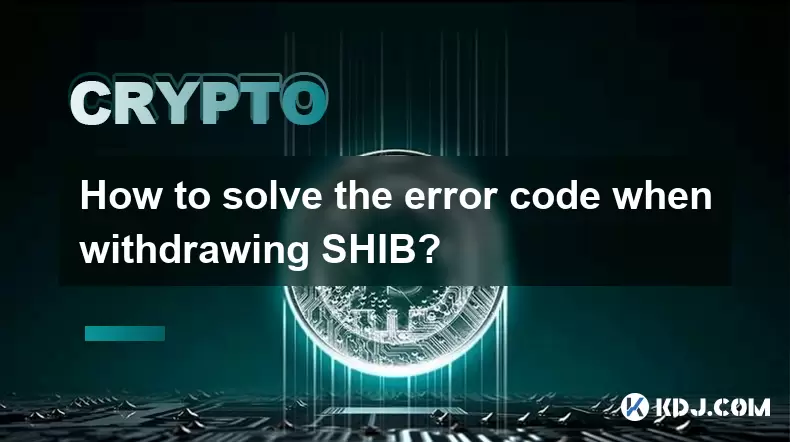
How to solve the error code when withdrawing SHIB?
May 14,2025 at 02:22am
Understanding Error Codes When Withdrawing SHIBWhen you attempt to withdraw Shiba Inu (SHIB) from an exchange or wallet, you might encounter various error codes. Understanding these error codes is crucial to successfully completing your transactions. Error codes are typically generated to inform users of specific issues that need to be addressed before ...
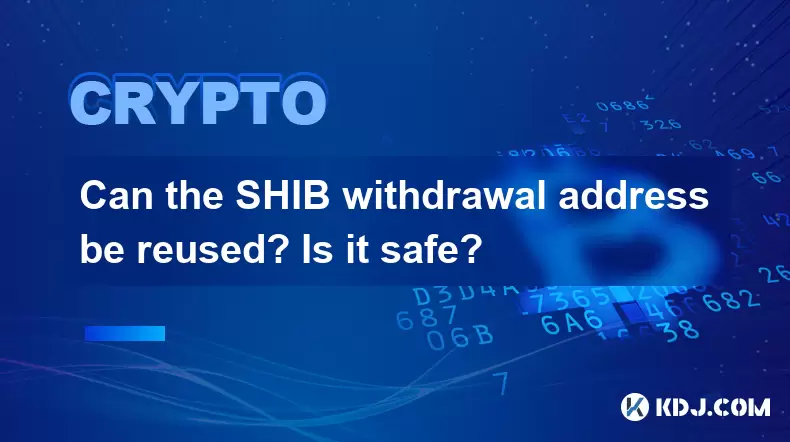
Can the SHIB withdrawal address be reused? Is it safe?
May 13,2025 at 04:42pm
Introduction to SHIB Withdrawal AddressesWhen it comes to Shiba Inu (SHIB) transactions, one of the critical aspects users need to understand is the nature and safety of withdrawal addresses. The SHIB withdrawal address plays a pivotal role in ensuring that your tokens are transferred securely from one wallet to another. A common question among users is...

What is the minimum withdrawal amount for SHIB? Is there a threshold?
May 13,2025 at 03:29pm
When it comes to withdrawing SHIB (Shiba Inu) from various cryptocurrency platforms, understanding the minimum withdrawal amount and any associated thresholds is crucial for managing your transactions efficiently. This article will delve into the specifics of SHIB withdrawals, focusing on the minimum amounts required, how these thresholds are set, and w...
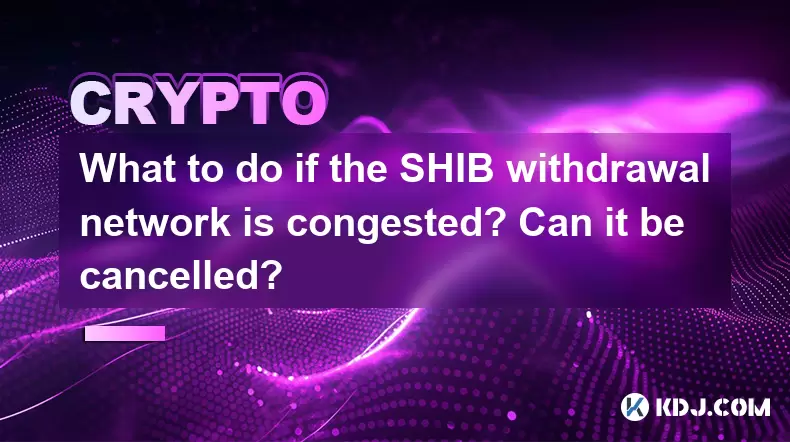
What to do if the SHIB withdrawal network is congested? Can it be cancelled?
May 13,2025 at 05:07pm
If you're facing issues with the SHIB withdrawal network being congested, it's important to understand your options and the steps you can take. Congestion in the network can lead to delays in transaction processing, and knowing whether you can cancel a pending transaction is crucial. Let's explore this topic in detail. Understanding SHIB Withdrawal Netw...
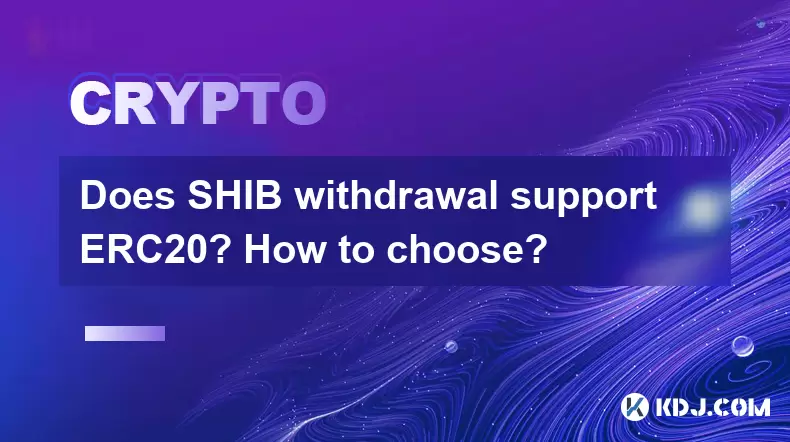
Does SHIB withdrawal support ERC20? How to choose?
May 14,2025 at 02:56am
Does SHIB withdrawal support ERC20? How to choose? Shiba Inu (SHIB) is a popular cryptocurrency that often raises questions about its withdrawal options, particularly in relation to the ERC20 token standard. This article will explore whether SHIB withdrawal supports ERC20 and provide a detailed guide on how to choose the best withdrawal method for your ...
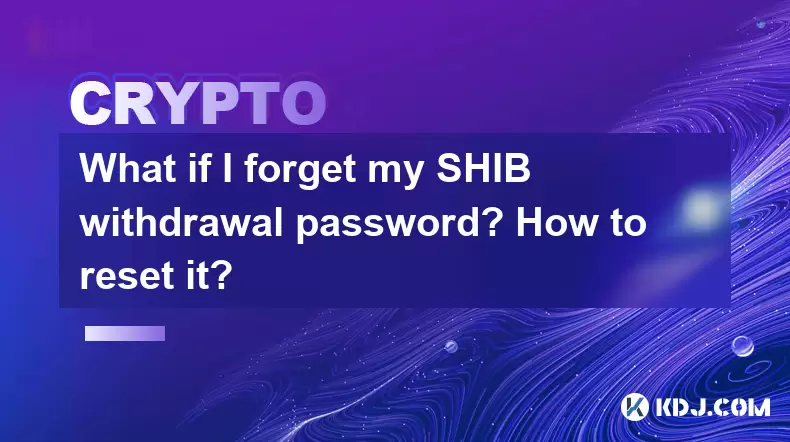
What if I forget my SHIB withdrawal password? How to reset it?
May 13,2025 at 03:15pm
Forgetting your SHIB withdrawal password can be a stressful experience, especially if you are eager to access your funds. Fortunately, there are steps you can take to reset your password and regain access to your SHIB. This article will guide you through the process of resetting your SHIB withdrawal password, ensuring that you can continue to manage you...

How to solve the error code when withdrawing SHIB?
May 14,2025 at 02:22am
Understanding Error Codes When Withdrawing SHIBWhen you attempt to withdraw Shiba Inu (SHIB) from an exchange or wallet, you might encounter various error codes. Understanding these error codes is crucial to successfully completing your transactions. Error codes are typically generated to inform users of specific issues that need to be addressed before ...

Can the SHIB withdrawal address be reused? Is it safe?
May 13,2025 at 04:42pm
Introduction to SHIB Withdrawal AddressesWhen it comes to Shiba Inu (SHIB) transactions, one of the critical aspects users need to understand is the nature and safety of withdrawal addresses. The SHIB withdrawal address plays a pivotal role in ensuring that your tokens are transferred securely from one wallet to another. A common question among users is...

What is the minimum withdrawal amount for SHIB? Is there a threshold?
May 13,2025 at 03:29pm
When it comes to withdrawing SHIB (Shiba Inu) from various cryptocurrency platforms, understanding the minimum withdrawal amount and any associated thresholds is crucial for managing your transactions efficiently. This article will delve into the specifics of SHIB withdrawals, focusing on the minimum amounts required, how these thresholds are set, and w...

What to do if the SHIB withdrawal network is congested? Can it be cancelled?
May 13,2025 at 05:07pm
If you're facing issues with the SHIB withdrawal network being congested, it's important to understand your options and the steps you can take. Congestion in the network can lead to delays in transaction processing, and knowing whether you can cancel a pending transaction is crucial. Let's explore this topic in detail. Understanding SHIB Withdrawal Netw...

Does SHIB withdrawal support ERC20? How to choose?
May 14,2025 at 02:56am
Does SHIB withdrawal support ERC20? How to choose? Shiba Inu (SHIB) is a popular cryptocurrency that often raises questions about its withdrawal options, particularly in relation to the ERC20 token standard. This article will explore whether SHIB withdrawal supports ERC20 and provide a detailed guide on how to choose the best withdrawal method for your ...

What if I forget my SHIB withdrawal password? How to reset it?
May 13,2025 at 03:15pm
Forgetting your SHIB withdrawal password can be a stressful experience, especially if you are eager to access your funds. Fortunately, there are steps you can take to reset your password and regain access to your SHIB. This article will guide you through the process of resetting your SHIB withdrawal password, ensuring that you can continue to manage you...
See all articles

























































































